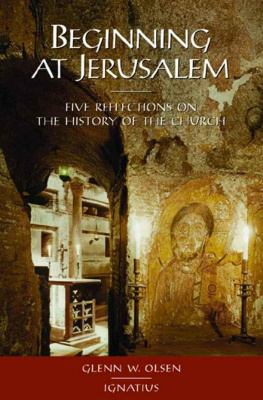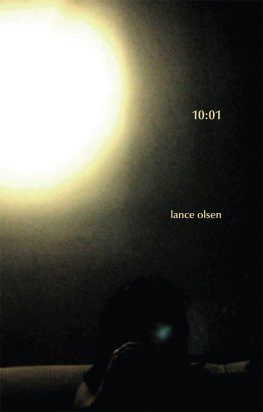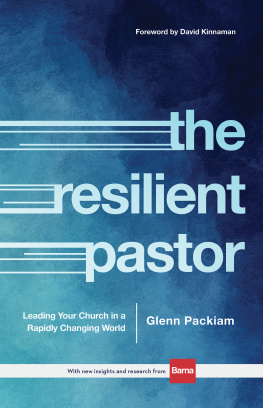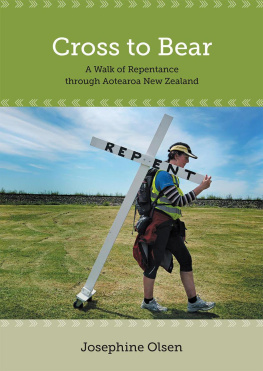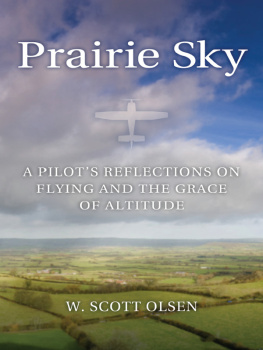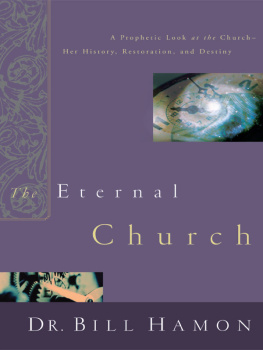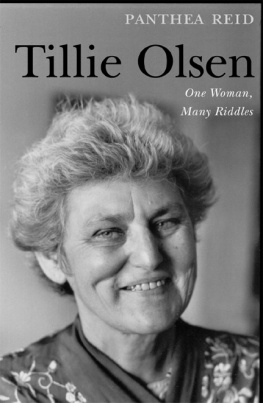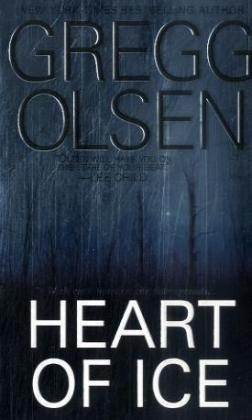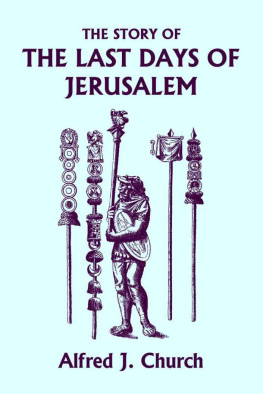Glenn W. Olsen - Beginning at Jerusalem: Five Reflections on the History of the Church
Here you can read online Glenn W. Olsen - Beginning at Jerusalem: Five Reflections on the History of the Church full text of the book (entire story) in english for free. Download pdf and epub, get meaning, cover and reviews about this ebook. year: 2004, publisher: Ignatius Press, genre: Religion. Description of the work, (preface) as well as reviews are available. Best literature library LitArk.com created for fans of good reading and offers a wide selection of genres:
Romance novel
Science fiction
Adventure
Detective
Science
History
Home and family
Prose
Art
Politics
Computer
Non-fiction
Religion
Business
Children
Humor
Choose a favorite category and find really read worthwhile books. Enjoy immersion in the world of imagination, feel the emotions of the characters or learn something new for yourself, make an fascinating discovery.
- Book:Beginning at Jerusalem: Five Reflections on the History of the Church
- Author:
- Publisher:Ignatius Press
- Genre:
- Year:2004
- Rating:3 / 5
- Favourites:Add to favourites
- Your mark:
- 60
- 1
- 2
- 3
- 4
- 5
Beginning at Jerusalem: Five Reflections on the History of the Church: summary, description and annotation
We offer to read an annotation, description, summary or preface (depends on what the author of the book "Beginning at Jerusalem: Five Reflections on the History of the Church" wrote himself). If you haven't found the necessary information about the book — write in the comments, we will try to find it.
Glenn W. Olsen: author's other books
Who wrote Beginning at Jerusalem: Five Reflections on the History of the Church? Find out the surname, the name of the author of the book and a list of all author's works by series.
Beginning at Jerusalem: Five Reflections on the History of the Church — read online for free the complete book (whole text) full work
Below is the text of the book, divided by pages. System saving the place of the last page read, allows you to conveniently read the book "Beginning at Jerusalem: Five Reflections on the History of the Church" online for free, without having to search again every time where you left off. Put a bookmark, and you can go to the page where you finished reading at any time.
Font size:
Interval:
Bookmark:
BEGINNING AT JERUSALEM
GLENN W. OLSEN
Five Reflections on the History of the Church
IGNATIUS PRESS SAN FRANCISCO
Excerpts from the English translation of the Catechism of the Catholic Church for use in the United States of America copyright 1994, United States Catholic Conference, Inc.Libreria Editrice Vaticana. English Translation of the Catechism of the Catholic Church: Modifications from the Editio Typica copyright 1997, United States Catholic Conference, Inc.Libreria Editrice Vaticana. Used with permission.
Unless otherwise noted, all Scripture quotations (except those included within the patristic texts themselves) have been taken from the Revised Standard Version of the Holy Bible, the Old Testament 1952, the Apocrypha 1957, the New Testament 1946, by the Division of Christian Education of the National Council of the Churches of Christ in the United States of America.
Cover art:
Burial niches with fresco Christ, ruler of the World (Pantocrator),
as followed in Byzantine pattern of the 7th or 8th century.
Catacomb of S. Callisto, Rome
Erich Lessing / Art Resource, New York
Cover design by Roxanne Mei Lum
2004 Ignatius Press, San Francisco
All rights reserved
ISBN 0-89870-992-x
Library of Congress Control Number 2003115829
Printed in the United States of America
For Suzanne
Et accepit uxorem nomine Susannam,...
pulchram nimis et timentem Dominum
(Daniel 13:2)
CONTENTS
PREFACE
In preparation for the turn to the third millennium, the Wethersfield Institute of the Homeland Foundation in New York City asked me to direct fifty lectures on Church history to be given in New York City, ten a year, during the last five years of the second millennium. I was to divide the history of the Church into five eras, and nine of the lectures each year were to present the range of historical developmentstheological, institutional, liturgicalwithin a single era. The tenth lecture, however, was to reflect on the significance of the period, even to draw lessons from it. Though the general public seems commonly to read its history for the lessons it might teach, most historians cringe at the suggestion that their main usefulness is the provision of such lessons, and I was no exception. As I thought about it, however, a greater problem emerged: How could I ever find five historical specialists willing to give such lectures? The answer, partly stemming from despair and partly stemming from the fact that one does not turn down opportunities to visit New York lightly, was to offer myself for these five lectures. Thus every November for five years I traveled to New York to give the tenth and final lecture on each period, in the process receiving the splendid hospitality of the Wethersfield Institute, usually offered in person by Msgr. Eugene Clark, now the rector of Saint Patricks Cathedral. Subsequently the Institute gave me permission to publish a revised form of my lectures. These constitute the five chapters of the present book. The fourth chapter also contains materials that were given in a lecture in Ashland, Oregon, in August 1998, on Thomas Mores Anticipation of the Political Dilemmas of Religion in the Modern World, at a Pacific Northwest Honors Conference sponsored by the Intercollegiate Studies Institute.
About the same time I was planning the first of the five lectures for New York City, I was asked to give four lectures on Prayer in the Catechism of the Catholic Church at the Cathedral of the Madeleine, Salt Lake City. In preparing these I was struck by the Catechisms treatment of the historical dimensions of prayer and subsequently reduced my four lectures to become appendices to the present hook, aiming at an exposition of prayer as relation and as Covenant drama. A number of the themes introduced in the five chaptershistory as drama, typology, the denial of general progressare developed in the appendices.
I have incurred many obligations in preparing this work. In addition to Msgr. Clark, special thanks are owed to Msgr. Francis Mannion, rector of the Cathedral of the Madeleine at the time my lectures were given, and to Deacon Owen Cummings, at the time director of religious education at the Cathedral. As always, however, my greatest debt is to my wife, Suzanne. Little did she know, many years ago, that the shared life of affectio maritalis would include so much giving of advice on everything from the meaning of Greek and Latin phrases to English usage.
I
Ancient Christianity and Us:
The Once and Future Church
The easy answer to explain the increasing unintelligibility and unfamiliarity of central Christian teachings and practices in our culture is that the age is opposed to them. Schools, parents, and pastors are disinclined to teach them and often themselves lack the education to do so. The more discomfiting answer is that these teachings and practices not only took form in a very different historical situation, but also in important ways depend on that earlier world. This answer implies that our problems are not merely doctrinal or moral, but cultural. If this is so, our task must in some degree be recovery of certain habits of being, certain ways of looking at the world, which are not usually perceived as, strictly speaking, at the heart of the Christian faith. That is the argument of the present chapter.
The aim here is to attempt for ancient Christianity something similar to the task Adriaan H. Bredero set himself for the Middle Ages in his book Christendom and Christianity in the Middle Ages . Carl A. Volz described Brederos book as an attempt to address the question of the acculturation of Christianity to medieval society and by so doing to raise the further question of how medieval Christianity still is, how much of this tradition is essential, and how much can be discarded. I cannot in one chapter take up all Brederos questions, which in any case I would reformulate somewhat differently because of my overriding interest in two problems. The first of these is the question of the relevance of ancient Christian developments to our present situation. There is so much that could be said here; there are so many subjects that could be broached! In the interest of economy and clarity, I will let analysis of a single, central question, how the telling of Church history itself passed from its ancient form to become secularized, stand in for dozens of other possible subjects of reflection.
I will follow a three-stage analysis that could be applied to these other subjects. I begin with realization of the inadequacy of modern approaches to this topic, that is, with the unsatisfactoriness of most Church history as now written. From this, in quest of imaginative alternatives, I turn to consideration of ancient approaches to the same topic. In the third stage of analysis I return to the present with alternatives gained from the past and ask how best to present these to a modern audience. Consideration of this one subject will take up most of this chapter, but toward the end I will turn to the second overriding question, already announced: How much of an ancient world view must be retained to keep Christianity intelligibleor rather flourishingin a modern setting? Here I suggest that central Christian teachings are becoming unintelligible in our world not just because they took form in a very different historical situation, but also because in some important ways they depend on that earlier world. Because, in the spirit of Alasdair MacIntyre, I think we have taken some wrong paths in the modern period, I want to ask whether there is a meaningful sense in which, by retracing our steps, we can find alternatives to what we now have. Clearly we have arrived at some dead ends. The question is whether knowledge of ancient Christianity can still feed our imaginations and suggest alternatives to what we now have.
Next pageFont size:
Interval:
Bookmark:
Similar books «Beginning at Jerusalem: Five Reflections on the History of the Church»
Look at similar books to Beginning at Jerusalem: Five Reflections on the History of the Church. We have selected literature similar in name and meaning in the hope of providing readers with more options to find new, interesting, not yet read works.
Discussion, reviews of the book Beginning at Jerusalem: Five Reflections on the History of the Church and just readers' own opinions. Leave your comments, write what you think about the work, its meaning or the main characters. Specify what exactly you liked and what you didn't like, and why you think so.

